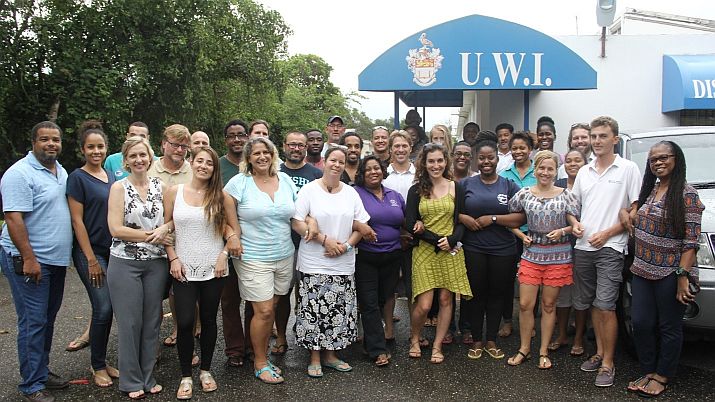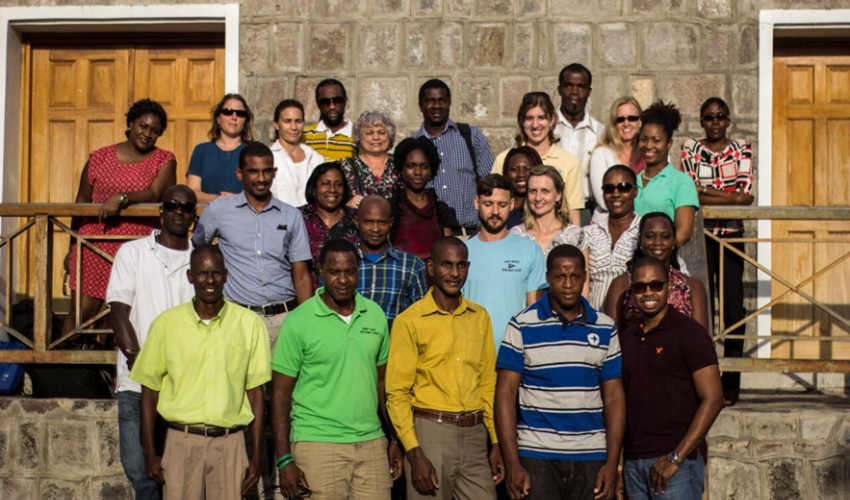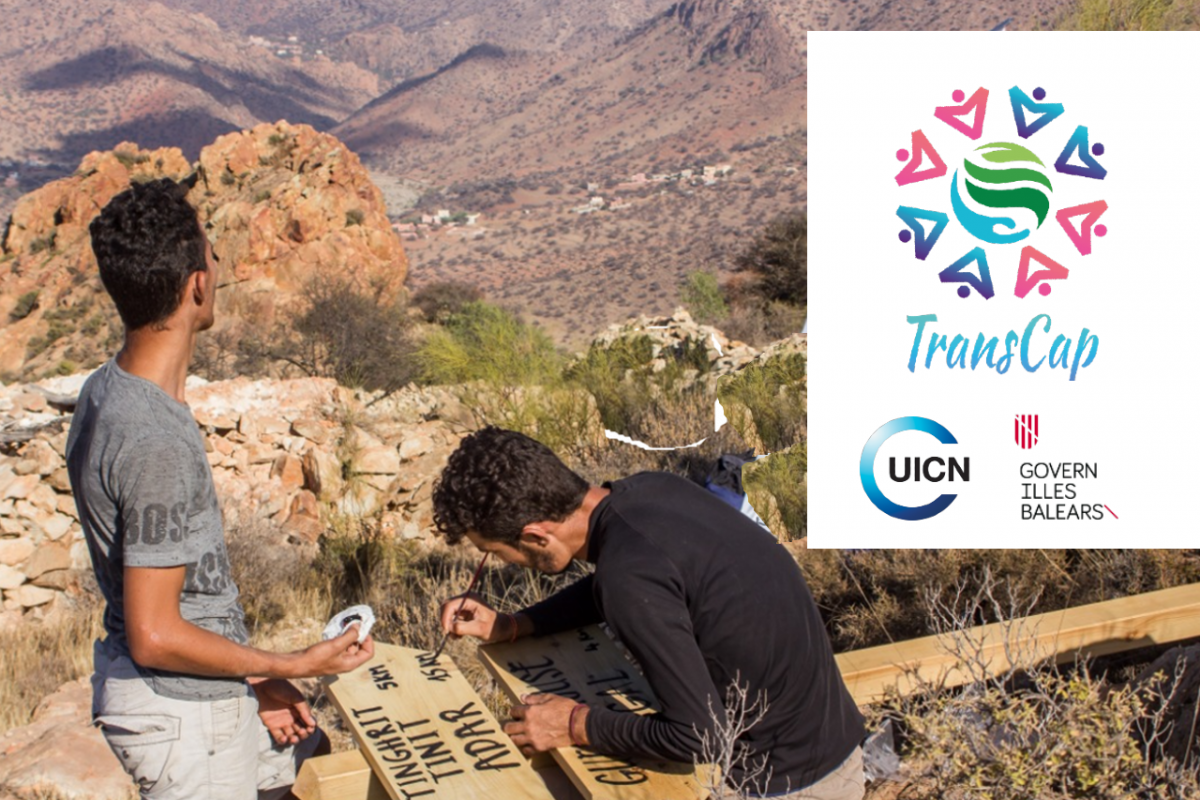Partnerships for integrated monitoring of coastal ecosystems in the Caribbean
CEESP News - by Maria Pena, Patrick McConney, Sherry Constantine and Lucie Labbouz
Integration of socio-economic data into monitoring of coastal ecosystems, particularly coral reefs, is a relatively recent phenomenon under development in the Caribbean region. SocMon Caribbean collaboration with regional and international partners is paving the way for providing coastal resource managers with a picture of human and environmental trends at coastal sites.

Photo: J. Wood
Coral reef scientists (socio-economic and ecological) and coastal managers from territories within and outside the Wider Caribbean link arms to demonstrate the integration of coral reef monitoring. Photo taken at inaugural GCRMN-Caribbean Guidelines Capacity Building Workshop: Towards comprehensive coral reef monitoring, 18-22 April 2016, Discovery Bay Jamaica. Photo credit J. Wood
The Global Socio-economic Monitoring Initiative for Coastal Management (SocMon) is continuing to develop and evolve to provide sound socio-economic data to inform coastal management decision-making and with further intent to influence policy globally. In the Caribbean, the regional SocMon node at the Centre for Resource Management and Environmental Studies (CERMES) at the University of the West Indies, Cave Hill Campus, Barbados, is building on Global SocMon 2015-2019 strategic goals. Two such goals currently being vigorously pursued are Integrating comprehensive monitoring for decision-making and Networking for resource mobilisation.
Effective and adaptive management of coastal sites, resource protection and conservation, access rights, and sustainable and/or alternative livelihoods of dependent communities are at the core of integrated socio-economic and bio-physical monitoring underway in the Caribbean via SocMon and its partners. The regional socio-economic monitoring capacity developed by the SocMon Caribbean node since 2003 has been recognised by large conservation organisations and monitoring networks. The Nature Conservancy (TNC; through its ECMMAN Project) and the revitalised Caribbean node of the Global Coral Reef Monitoring Network (GCRMN-Caribbean) have recently incorporated the SocMon methodology with relevant and vetted biophysical coral reef monitoring methods (such as AGRRA) towards achieving relevant marine resource conservation and management goals.
Within the last couple of years, SocMon Caribbean has been working with coral reef scientists to design comprehensive integrated monitoring programmes. For example, socio-economic monitoring programmes initiated at TNC ECMMAN project sites this year were developed based on collaboration with the project’s coral reef ecologist to align socio-economic and ecological indicators. Socio-economic data currently being collected will provide information on inter alia:
- level of support for the implementation of management measures for restoring, conserving and protecting key ecological indicators such as corals, parrotfish and black sea urchins;
- perceptions of trends in size and abundance of key ecological indicator species;
- perceptions of resource conditions;
- level of dependency on coastal and marine resources for income generation;
- livelihood diversification of dependent communities;
- barriers to pursuing alternative livelihoods;
- level of use of coastal and marine resources by outsiders;
- perceived threats to marine resources and therefore indicator species; and
- motivations for supporting (or not) management of ecologically and/or commercially important fish species, reefs, seagrass beds and mangroves.
The intent is that this information will be coupled with that of biophysical data for each site to provide an integrated picture of the socio-economic-ecological characteristics and trends of coastal and marine management sites. It is hoped that 2017 report cards for each ECMMAN site will be produced that now incorporate valuable socio-economic information…a welcomed addition to their 2016 Coral Reef Report Card predecessors.
Site monitoring soon to be implemented in Jamaica, and the Dutch and French Antilles by GCRMN-Caribbean later this year will also incorporate SocMon into bio-physical monitoring. SocMon is part of the wider monitoring effort of the GCRMN, hence the rationale for GCRMN-Caribbean using SocMon for promoting an integrated approach with socio-economic monitoring. GCRMN recommended socio-economic monitoring parameters have been developed and will be used in combination with the already established SocMon Caribbean guidelines to improve coral reef monitoring, data collection and data management in the region.
 Photo: TNC
Photo: TNC
Regional coral reef practitioners are introduced to integrating socio-economic and ecological monitoring during TNC’s ECMMAN Workshop on Eastern Caribbean Coral Reef Monitoring, 14-19 September 2015, St. Kitts and Nevis. Photo credit: TNC
The integration of socio-economic data in monitoring coastal ecosystems, and coral reefs in particular, is a relatively recent phenomenon under development in the Caribbean region. SocMon Caribbean collaborations with GCRMN-Caribbean and TNC (and others in the future) are paving the way for providing coastal and marine resource managers with a comprehensive picture of the human and environmental trends at sites (fishing villages and marine protected areas), how they are interlinked and how we might improve management in order to address socio-economic and ecological changes and threats, and their impacts on conservation, management and marine livelihoods.
Sustained and rigourous integrated coral reef monitoring combined with strategic reporting are essential drivers for improved human well-being, ecosystem-based management and regional policy processes. Uptake of this integrated monitoring data in management, decision-making and policy development should position the Caribbean to improve the protection and management of its precious coastal and marine resources.
For further information contact:
Peter Edwards (Global SocMon Coordinator) at peter.edwards@noaa.gov or
Maria Pena (SocMon Caribbean Coordinator and GCRMN-Caribbean Co-Chair) at maria.pena@cavehill.uwi.edu
Lucie Labbouz (GCRMN-Caribbean Chair) at lucie.labbouz.carspaw@guadeloupe-parcnational.fr
Sherry Constantine (Senior Programme Manager, TNC Eastern Caribbean Office) at sconstantine@TNC.ORG



